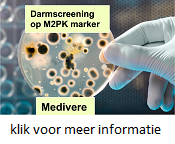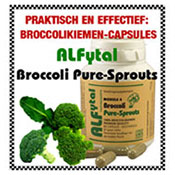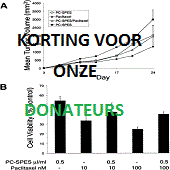31 juli 2010: In the NEJM - New England Journal of Medicin is deze week een uitgebreid artikel plus volledige studierapport verschenen over Provenge, het immuuntherapeutische middel bij hormoonresistente prostaatkanker. Het vaccin dat in feite puur dendritische celtherapie is dat goedgekeurd is door de FDA nadat een fase III studie voor opmerkelijke levensverlenging heeft gezorgd bij prostaatkankerpatienten. Klik hier voor artikel uit NEJM en meer informatie over Provenge. Voor artikel uit NEJM klik daar op NE Journal of Medicine Article
1 mei 2010: De FDA heeft eindelijk Provenge goedgekeurd om als immuuntherapie te gebruiken bij mensen met asymptomatische of minimaal symptomatische gemetastaseerde, hormoon-resistente prostaatkanker ( mCRPC). Deze immuuntherapie wordt aangeduid als: sipuleucel-T is een autologe actieve cellulaire immunotherapie, wat betekent dat het gemaakt is van de witte bloedlichaampjes van de patiënt zelf en stimuleert het immuunsysteem van de patient om te reageren tegen de kanker. De behandeling moet individueel worden vervaardigd voor iedere patiënt zegt het persbericht. Dit lijkt me logisch als je dendritische cellen haalt uit het bloed van de patient zelf. Provenge is in feite gewoon dendritische celtherapie . Maar lees hieronder meer over Provenge en de toepassing en de studies die daarmee gedaan zijn.
3 mei 2009: Studieresultaten toegevoegd aan bericht van 16 april jl. via Medscape publicatie:
Via Medscape zijn nu ook de exacte resultaten uit de fase III studie vrijgekomen van Provenge met dendritische celtherapie bij hormoonresistente prostaatkankerpatienten. Voor alle duidelijkheid dit is o.a. zoals dr. Robert Gorter min of meer werkt met dendritische celtherapie. Vaccins gemaakt van de leucocyten en monocyten terugbrengen in het lichaam van de patient na eventueel in contact gebracht met tumorweefsel van de patient zelf. .Zie de video van bv. meneer Hagemeyer met prostaatkanker onder de knop video die met dendritische celtherapie en hyperthermie klinisch kankervrij werd door behandelingen in het Medisch Centrum Keulen.
Hieronder het artikel uit Medscape met daaronder de eerdere berichtgeving over Provenge met dendritische celtherapie.
Resultaten:
De studie volgde 512 mannen met minimale of a-symptomatische gemetasteerde hormoon-resistente prostaatkanker welke waren verdeeld - gerandomiseerd in een 2:1 modus naar sipuleucel-T of placebo. Het vaccin was verkregen van de leucocyten van de patient, welke ontwikkeld werden over een 2- of 3-dageljkse periode en dan terugebracht in de patient per infuus op dag 3 of 4 . Drie cycli werden per maand toegediend Sipuleucel-T verlengde mediane overleving met 4.1 maanden; mediane overleving was 25.8 maanden met actieve behandeling en 21.7 maanden met placebo.
3-jaarsoverleving verbeterde ten opzichte van placebo met 38% (31.7% vs 23.0%).
"Deze 4-maanden verlenging in overleving is bijzonder belangrijk," vertelt Dr. Penson aan Medscape Urology. "Deze patienten hebben een levensverwachting van ca. 2 jaar, dus als je hun 4 maanden erbij geeft is dat tameljk belangrijk. Het geeft hun ongeveer 20% langer leven. En [sipuleucel-T] doet dat met minimale bijwerkingen. Dus er is een verbeterde levensduur met goede kwaliteit van leven.
"De IMPACT studie bereikte een P waarde van .032, een statstisch significante verbetering van de levensduur," volgens een Dendreon persbericht.
AUA 2009: Prostate Cancer Vaccine Significantly Improves 3-Year Survival
April 29, 2009 (Chicago, Illinois) — Phase 3 results from the Immunotherapy for Prostate AdenoCarcinoma Treatment (IMPACT) study, presented here at the American Urological Association (AUA) 104th Annual Scientific Meeting, showed that prostate cancer immunotherapy with sipuleucel-T (Provenge, Dendreon Corp.) extended median survival by 4.1 months and improved 4-year survival by 38%.
Results from the IMPACT study were presented by David F. Penson, MD, MPH, professor of medicine at the University of Southern California at Los Angeles. The study involved 512 men with minimally or asymptomatic metastatic castrate-resistant prostate cancer who were randomized in a 2:1 fashion to sipuleucel-T or placebo.
The vaccine was manufactured from the patient's leukocytes, which were expanded over a 2- or 3-day period and then reinfused on day 3 or 4 on an outpatient basis. Three cycles were given over the course of a month.
Sipuleucel-T extended median survival by 4.1 months; median survival was 25.8 months with active treatment and 21.7 months with placebo.
Three-year survival was improved by 38% compared with placebo (31.7% vs 23.0%).
"This 4-month extension in survival is very, very significant," Dr. Penson told Medscape Urology. "These patients have a life expectancy of about 2 years, so giving them 4 more months is pretty important. It gives them about 20% more life. And [sipuleucel-T] does it with minimal adverse events. So there is improved survival with good quality of life."
Treatments were extremely well tolerated, with chills reported in 54.1% of patients (vs 12.5% with placebo), fever in 29.3% (vs 13.7%), headache in 16.1% (vs 5%), and flu-like symptoms in 9.8% (vs 4.3% ). Most adverse events lasted only a few days and were treatable with aspirin. "Some of our patients were golfing the day after treatment," Dr. Penson told reporters.
"The IMPACT study achieved a P value of .032, successfully exceeding the prespecified level of statistical significance," according to a Dendreon release.
Last year, the US Food and Drug Administration (FDA) deferred approval of sipuleucel-T until a statistically significant improvement in survival could be shown.
"The company and the FDA have to get back together to re-evaluate the results, but in my opinion, I think they should approve it."
AUA spokesman J. Brantley Thrasher, MD, chair of the Department of Urology at the University of Kansas in Kansas City, Kansas, pointed out to Medscape Urology that "last year, the FDA put a damper on the approval process. They were looking for more survival data. This should give it to them."
"This will cause a big splash," Dr. Thrasher continued. "We don't have anything for patients with hormone-refractory disease, which is very aggressive. . . . Improved survival with T cell immunotherapy is really very significant."
Dr. Penson and Dr. Thrasher have disclosed no relevant financial relationships.
American Urological Association 104th Annual Scientific Meeting: Late Breaking Abstract 9: Presented April 28, 2009.
Eindelijk wordt dan toch door de FDA geaccepteerd dat Provenge, een immuuntherapeutisch middel gekoppeld aan dendritische celtherapie significant betere resutlaten geeft bij gevorderde prostaatkanker. Dit klinkt als heel goed nieuws. Hieronder de aankondiging van deze beslissing op de website van Dendreon en een artikel in The Los Angeles Times hierover. Voor alle duidelijkheid Provenge is een medicijn dat "verkregen" wordt van de tumor bij de patient zelf. Dus dit middel is geen chemisch middel maar komt van de patient zelf. Dit middel wordt dan in een laboratorium in contact gebracht met de dendritische clelen die eerder uit het bloed van de patient zelf zijn gemaakt en daarna teruggegeven aan de kankerpatient. Precies zoals dr. Robert Gorter werkt als er eigen tumorweefsel voorhanden is dat nog niet door chemo of bestraling is beinvloed. 20 april a.s. worden de volledige resultaten uit de fase III studie bekendgemaakt op een speciale persconferentie door Dendreon.
PROVENGE Significantly Prolongs Survival in Men with Advanced Prostate Cancer in Pivotal Phase 3 IMPACT Study
– Study Meets Primary Endpoint Showing Statistically Significant Improvement in Overall Survival –
SEATTLE, April 14, 2009 - Dendreon Corporation (Nasdaq: DNDN) announced today that the pivotal Phase 3 IMPACT study of PROVENGE® (sipuleucel-T) in men with advanced prostate cancer met its primary endpoint of improving overall survival compared to a placebo control. The magnitude of the survival difference observed in the intent to treat population resulted in the study successfully achieving the pre-specified level of statistical significance defined by the study's design. The safety profile of PROVENGE appeared to be consistent with prior trials.
The 512-patient, multi-center, randomized, double-blind, placebo-controlled IMPACT (IMmunotherapy for Prostate AdenoCarcinoma Treatment) study enrolled men with metastatic androgen-independent prostate cancer was conducted under a Special Protocol Assessment agreement with the U.S. Food and Drug Administration (FDA).
Bron: Los Angeles Times:
PROVENGE is Dendreon's investigational product candidate for men with advanced prostate cancer and may represent the first in a new class of active cellular immunotherapies specifically designed to engage the patient's own immune system against cancer.
Detailed results from the IMPACT study will be presented during a plenary session at the American Urological Association's Annual Meeting in Chicago on Tues., Apr. 28 at 2:20 pm CT.
A controversial prostate cancer vaccine produced by Dendreon Corp. of Seattle "significantly" improves survival of patients, the company said Tuesday morning without releasing further details of the trial. The trial was designed to detect a minimum 22% increase in survival and experts speculate that it did at least that well. Further results of the trial will be released April 28 at a meeting of the American Urological Assn. If those findings are upheld, the vaccine, called Provenge, could be the first cancer vaccine approved by the Food and Drug Administration.
Provenge is a so-called therapeutic vaccine designed to treat the disease rather than prevent it from occurring. Physicians collect specialized immune cells called dendritic cells from the patient's blood, mix them with proteins collected from the surface of tumor cells and inject them back into the patient in three doses at two-week intervals.
In an earlier study of the vaccine, the company found that it increased survival of patients with advanced prostate cancer that had spread beyond the prostate by 18 weeks compared to patients given a placebo. After three years, 34% of those in the vaccine group survived, compared to 11% of those in the placebo group. An FDA advisory committee recommended that the agency approve the vaccine for marketing, but the FDA disagreed, arguing that the study did not provide evidence that the vaccine slowed progression of tumors.
Gerelateerde artikelen
- Afro-Amerikanen met uitgezaaide prostaatkanker doen het beter dan blanke mannen na immuuntherapie met Provenge - sipuleucel-T. Overall overleving was 12 procent beter
- immuuntherapie met Provenge - Spirutacel-T geeft betere resultaten op overall overleving bij gevorderde prostaatkanker als deze gevolgd wordt door dendritische celtherapie
- Provenge, het eerste immuuntherapeutische middel voor prostaatkanker staat ter discussie wegens twijfels over opzet van studies. Ook worden medewerkers van dendreon verdacht van fraude en oplichting
- Provenge - Sipuleucel-T, vaccinatie in combinatie met dendritische cellen bewijst in nieuwe studies te zorgen voor significante levensverlenging bij patienten met hormoonresistente prostaatkanker. Lees hier volledige studierapporten
- Het vaccin Provenge zorgt voor lange uitsteltijd - drie keer zo lang dan zonder Provenge - van PSA stijging na eerste lijnsbehandeling.
- Provenge als immuuntherapie in de vorm van dendritische celtherapie bij hormoonresistente gevorderde prostaatkanker geeft significant meer overlevingen. 3 jaars overleving gaat 38% omhoog. FDA geeft goedkeuring aan Provenge. Zie NEJM studierapport.
- Provenge,- Sipuleucel-T, het immuuntherapeutische middel bij prostaatkanker kost $ 31.000 per injectie. Voor een minimale kuur van 3 injecties is de prijs $ 93.000,--
- Driejaars meting van fase III studie bij prostaatkankerpatiënten en resultaat van fase II studie met gevorderde prostaatkankerpatiënten bewijst opnieuw significant betere resultaten dan placebo van behandeling met Provenge samen met Avastin.
- Dubbelblinde gerandomiseerde fase III studie bewijst uitstekend effect van Provenge. 3,5 keer langere overlevingstijd en minder pijn.
- Provenge een immuuntherapie met dendritische cellen bij prostaatkanker: een aantal artikelen bij elkaar gezet











Plaats een reactie ...
Reageer op "Provenge als immuuntherapie in de vorm van dendritische celtherapie bij hormoonresistente gevorderde prostaatkanker geeft significant meer overlevingen. 3 jaars overleving gaat 38% omhoog. FDA geeft goedkeuring aan Provenge. Zie NEJM studierapport."